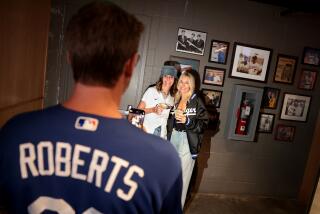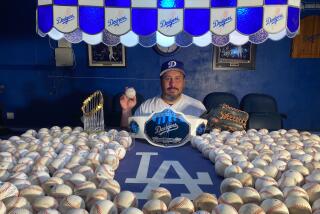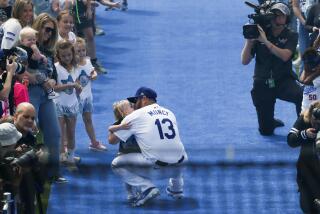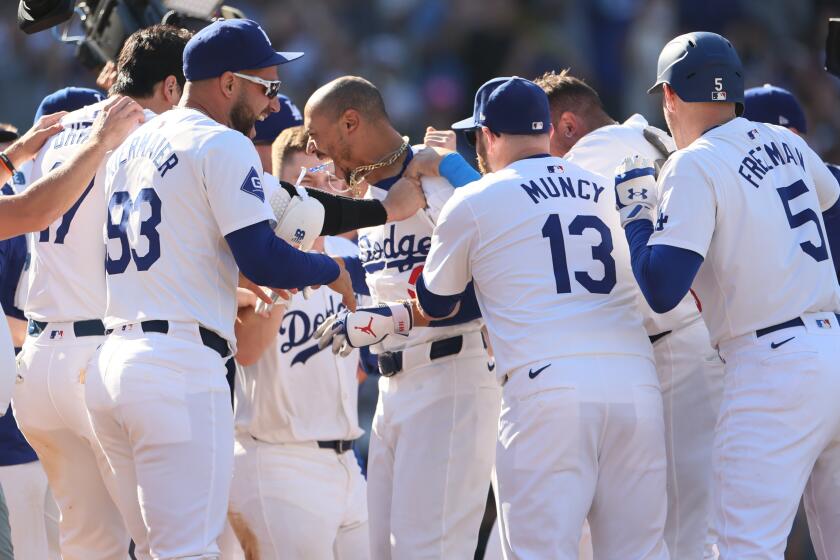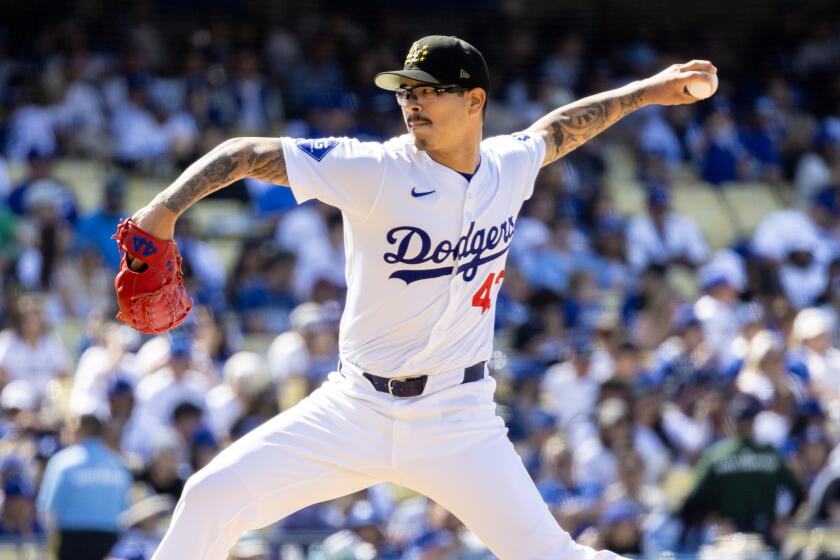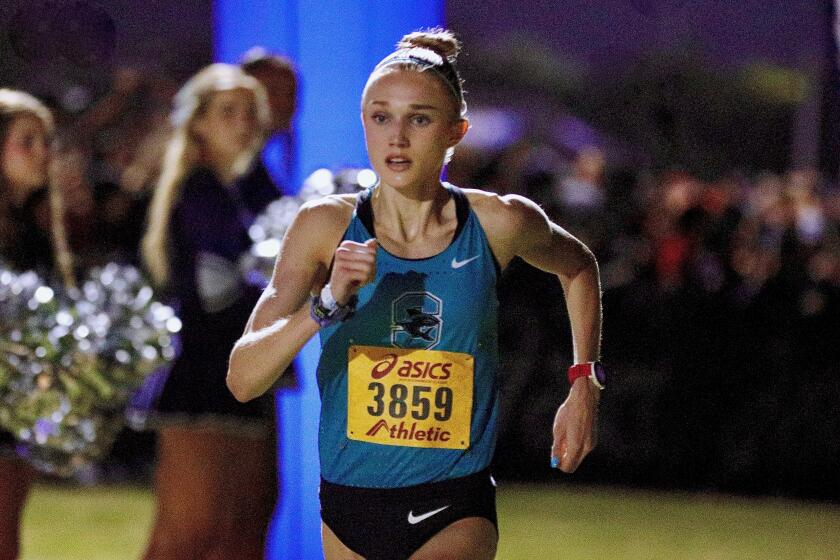Fernando Valenzuela was a game-changer for the Dodgers, baseball, and Los Angeles
As he did 30 years ago, Fernando Valenzuela will take the mound at Dodger Stadium on opening day.
From the very place he started a phenomenon that radically altered the country’s cultural and sporting landscape, Valenzuela will throw the ceremonial first pitch before the Dodgers face the San Francisco Giants on Thursday.
Fernandomania will return to Los Angeles -- but with a notable difference.
When he winds up to throw the ball, Valenzuela won’t look skyward the way he used to.
“I can’t do it if I think about it. I would fall down, especially if I’m wearing street shoes,” he said, laughing. “It wasn’t something I did because I wanted to. I didn’t even know I did that until someone showed me a video.”
Photos: The Fernando Valenzuela years
Valenzuela said he was similarly oblivious to how his performance on the baseball field was influencing the world around him. He couldn’t see beyond the surface -- the huge crowds that met him at every stop, the demands on his time, his win-loss record, the rotation on his trademark “screwball” pitch.
He was only 20 years old when then-manager Tom Lasorda chose him as the Dodgers’ opening-day starter in 1981. The pudgy left-hander, born in the remote Mexican town of Etchohuaquila, had moved to the United States less than two years earlier.
“I had just come here and I didn’t know what life was like for the Mexican, the Latino, in the United States,” Valenzuela said. “It was difficult for me to comprehend that. I was focused on myself.”
He said he didn’t notice more Latinos in the seats at Dodger Stadium. Or that he was helping ease long-standing ethnic and cultural tensions in the city. Or that he was drawing the attention of businesses to the growing Latino market. Or that because of him teams were increasingly looking outside the country for players.
“The impact he made not only in Southern California but in all of the country, it was really great for the game,” said Bud Selig, commissioner of baseball.
Now 50, Valenzuela is as unassuming today as he was unaware back then.
Poll: Should the Dodgers retire Fernando Valenzuela’s number?
His eyes often hidden behind sunglasses, he wears Guayabera shirts that are popular in Mexico and doesn’t say much. But he has a quirky sense of humor.
“Ey,” you call to him, and he responds, “B, C,” as if reciting the alphabet.
“What’s up?” you ask him, and he tells you, “The ceiling.”
A color commentator on the Dodgers’ Spanish-language broadcasts, he wears a credential around his neck like every other member of the media. But at Dodger Stadium he wouldn’t need it; he is recognized everywhere.
The lasting impact of his superlative rookie season -- he won the Cy Young, rookie of the year and Silver Slugger awards, as well as a World Series championship ring -- can be seen in the crowds.
“Now, you go to the ballpark, there are certain sections where they speak more Spanish than English,” said Jaime Jarrin, the Dodgers’ longtime Spanish-language broadcaster.
The Dodgers, who said they drew more than 3.5 million fans last season, have survey research that indicates about 40% of their fan base is Latino.
Although there is no way to directly quantify Valenzuela’s effect, former team executive Derrick Hall guessed that attendance at Dodger Stadium would be 10% to 20% lower had Valenzuela never played.
Because of that and his pitching, “I personally think Fernando belongs in the Hall of Fame,” said Hall, now president of the Arizona Diamondbacks.
Until Valenzuela wore a Dodgers uniform, the Mexican American community in Los Angeles viewed the franchise “with a degree of wariness,” said Samuel Regalado, a history professor at Cal State Stanislaus whose fields of expertise include U.S. immigration, Latin America and sports.
“The construction of Dodger Stadium was not one of the highlights of the Mexican community,” Regalado said of the Dodgers’ takeover of what used to be a Mexican American neighborhood.
Dodgers have new sense of purpose
But by the time Valenzuela became a Dodger, Regalado said, social activism of the 1960s had been replaced by a growing desire for assimilation by the end of the 1970s. More Latinos were educated, and more had money to spend.
The late Walter O’Malley, who moved the club to L.A. from Brooklyn before the 1958 season, had anticipated as much.
Jarrin said O’Malley was particularly mindful of the Mexican American community, evidenced by how the Dodgers started Spanish-language radio broadcasts as soon they moved to Los Angeles.
“He had a vision,” Jarrin said. “He knew that eventually that market would grow and would be a very important part of the business for the Dodgers.”
So, when scout Corito Verona sent word from Mexico about a promising 17-year-old pitcher, O’Malley dispatched another scout to get a second opinion. Valenzuela was signed in 1979 for $120,000.
The very next year, Valenzuela broke into the majors as a September call-up and pitched 17 2/3 scoreless innings in relief to help the Dodgers force a one-game playoff with the Houston Astros for the National League West title. (They lost.)
Then, in 1981, with veterans Jerry Reuss and Burt Hooton hurt, Valenzuela drew the starting assignment on opening day. He responded with a shutout, beating the Astros, 2-0.
Valenzuela’s arrival coincided with a period of growth for Spanish-language media, ensuring that the Latino community would be aware of him. But Valenzuela transcended ethnicity and race. Everyone wanted to watch him pitch.
“The phones kept ringing at Dodger Stadium,” said Steve Brener, then the team’s director of public relations. “People were asking, ‘When is Fernando going to pitch?’ ”
Valenzuela started the season 8-0 with an earned-run average of 0.50, and public demand for him became so insatiable that he held a news conference in every city the Dodgers visited. Jarrin served as his interpreter.
Peter O’Malley, who took over the family business after his father’s death in 1979, called Valenzuela “the ideal pioneer.”
In the middle of the 1981 season, Valenzuela was invited to a White House luncheon that President Reagan hosted for Mexican President Jose Lopez Portillo.
“The most powerful men in the world were waiting in line for an autograph,” Jarrin recalled.
No Latino athlete before Valenzuela had been embraced in such a way by the American mainstream. Valenzuela didn’t even speak English, but he played for one of baseball’s great institutions.
“Being Mexican and growing up here, you didn’t see too many people in those kinds of positions,” said Dodgers catcher Rod Barajas, who was raised in Norwalk. “You didn’t see movie stars, actors, anything. He let the community know it didn’t matter what race you were, you could reach your goals.”
In addition to providing Anglos and Latinos a common source of entertainment, Valenzuela brought together Mexicans and Mexican nationals, who “had been at odds with each other for generations,” said Regalado, the Stanislaus professor.
A generation after Fernandomania, there is significant diversity among the Dodgers’ Latino fans. Whereas 25% of those fans speak only English, 15% speak only Spanish, which is the primary language for 38%, according to a fan survey commissioned by the Dodgers.
The game itself is more diverse too. Valenzuela’s success led to careers for ballplayers of many nationalities. Under O’Malley ownership, the Dodgers set up an academy in the Dominican Republic. They built fields in China and Nicaragua. They signed Hideo Nomo from Japan and Chan Ho Park of South Korea.
“He opened the borders of major league baseball,” Hall, the former Dodgers executive, said of Valenzuela.
Hall’s persistence was responsible for Valenzuela’s return to the Dodgers as a broadcaster in 2003. Valenzuela’s ties with the organization were severed in 1991, when the Dodgers let him go on the day his $2.55-million contract would have become guaranteed.
Valenzuela said that when he came back, he didn’t know how he would be received.
“I had been away for so long,” he said. “I hadn’t even been there to watch games.”
Yet, even now when video of him in the broadcast booth is shown on the scoreboard at Dodger Stadium, fans stand and applaud.
Jarrin said he can think of only two other Dodgers who are similarly received by fans: Lasorda and Sandy Koufax.
That widespread adoration is why the Dodgers won’t let anyone wear Valenzuela’s No. 34, although the number isn’t officially retired. When slugger Manny Ramirez moved to the Dodgers in the middle of the 2008 season and asked for No. 34, clubhouse manager Mitch Poole told him to pick another number.
Valenzuela said he is flattered by the suggestion that he had far-reaching influence, but he considers his greatest achievement to be something he did on a significantly smaller scale.
As a player, Valenzuela spoke regularly at Los Angeles-area elementary schools, many of them in heavily Latino areas.
“In sports, you win and you lose,” he recalled telling the children. “But in education, you only win. Sports careers end quickly. An education can lead to a career that lasts a lot longer.”
On a couple of occasions, he said, he has been approached by someone who heard him speak.
“Because of what you said, I studied hard and became a doctor,” he recalled one person telling him.
Another, he said, was a lawyer.
“I told them I was glad they listened, that they were able to improve their lives, that they were able to take better care of their families,” he said. “That means more to me than winning a game or being elected into the Hall of Fame. There’s nothing you can compare it to. It’s priceless.”
More to Read
Go beyond the scoreboard
Get the latest on L.A.'s teams in the daily Sports Report newsletter.
You may occasionally receive promotional content from the Los Angeles Times.
